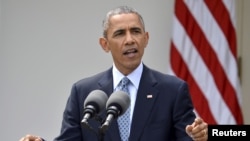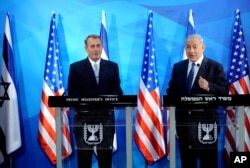While the framework nuclear deal reached last week between Iran and six world powers would lengthen the current time needed by the Islamic Republic to make a weapon, that buffer period would shrink to almost nothing after 13 years, U.S. President Barack Obama acknowledged Tuesday.
That concession, made in an interview with American news organization NPR, drew withering criticism from U.S. House Speaker John Boehner, who said it justified critics' fears.
"It is clear that this 'deal' is a direct threat to peace and security of the region and the world,'' the Republican leader said. "No one should believe that the proposed inspection and verification are bullet-proof.''
Obama, in the midst of promoting the deal, was pushing back against critics' claims that it fails to eliminate risk because it allows Iran to keep enriching uranium.
The president told NPR the Iran's capabilities will be capped for a decade at 300 kilograms – not enough to convert to a stockpile of weapons-grade material. It would extend the country's "breakout time" – the period needed to acquire sufficient material for a weapon – to at least a year, up from an estimated two or three months now.
After a decade, some restrictions would start phasing out. In years 13 to 15 of the deal, Obama said, Iran could use "advanced centrifuges that enrich uranium fairly rapidly. And at that point, the breakout times would have shrunk almost down to zero."
Questions continue
The admission comes as Obama seeks to quiet a growing chorus questioning whether the deal negotiated by his administration, along with other permanent members of the U.N. Security Council and Germany, merely delays the certainty of a nuclear-armed Iran.
The framework deal is aimed at providing relief from international sanctions in exchange for curbing Tehran's nuclear program. The agreement followed months of intensive talks and has set the stage for a final agreement to be completed by June 30.
Obama has insisted that Iran will not produce a nuclear weapon on his watch, which ends in roughly 20 months. Any successor still would have leverage, he added, saying "the option of a future president to take action if in fact they try to obtain a nuclear weapon is undiminished."
Boehner and others have called for a congressional review of the preliminary deal’s details, as well as a vote whether to approve it. The president has ruled that out.
Meanwhile, U.S. Senator Bob Corker, the Republican who chairs the Senate Foreign Relations Committee, is promoting legislation that would block Obama from temporarily waiving U.S. sanctions during a congressional review of the deal, the Associated Press said.
Israel repeats objections
Obama also rejected a call by Israel that any final nuclear agreement with Iran include a "clear and unambiguous Iranian commitment of Israel's right to exist."
Israeli Prime Minister Benjamin Netanyahu had issued the demand Friday while strongly criticizing the framework nuclear deal reached last Thursday at talks in Switzerland.
In the NPR interview, Obama said: "The notion that we would condition Iran not getting nuclear weapons in a verifiable deal on Iran recognizing Israel is really akin to saying that we won't sign a deal unless the nature of the Iranian regime completely transforms. And that is, I think, a fundamental misjudgment.
"We want Iran not to have nuclear weapons precisely because we can't bank on the nature of the regime changing. That's exactly why we don't want to have nuclear weapons. If, suddenly, Iran transformed itself to Germany or Sweden or France, then there would be a different set of conversations about their nuclear infrastructure," he said.
Israel insists the framework nuclear agreement threatens its survival. Netanyahu has said he would press U.S. lawmakers not to give Tehran "a free path to the bomb."
Netanyahu appeals to U.S. Congress
In U.S. television appearances Sunday, Netanyahu said he has discussed the issue with both Democrats and Republicans in Congress – nearly two-thirds of House of Representatives members and a similar number in the U.S. Senate.
Iran's President Hassan Rouhani has vowed that Iran will honor all of its pledges in the agreement "as long as the other side honors its promises as well."
Obama also said in the NPR interview, released Tuesday, that the U.S. and European negotiators are trying to reach a deal with Iran in which sanctions could be reimposed without a U.N. Security Council vote, where Tehran-ally Russia could exercise its veto power.
"We are absolutely convinced we can do it again," Obama said of the international sanctions, which have crippled Iran's economy.
He said reimposing sanctions would be triggered if the International Atomic Energy Agency found Tehran violating the agreement.
Iranian hard-liners object to deal
Meanwhile, about 200 Iranian hard-liners rallied against the framework deal, the country's official IRNA news agency reported Tuesday.
The rally coincided with a closed session of parliament during which Foreign Minister Mohammad Javad Zarif, who led Iran's negotiating team at the talks, appeared before lawmakers to explain the agreement.
The hard-liners gathered in front of parliament in Tehran without permission by authorities, IRNA reported. Protesters carried banners calling the agreement a "defeat" – despite the establishment's overwhelming support of the framework deal, including by Rouhani.
Some material for this report came from Reuters and AP.

